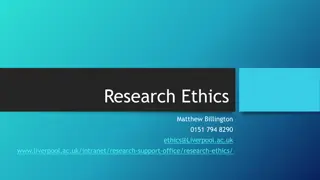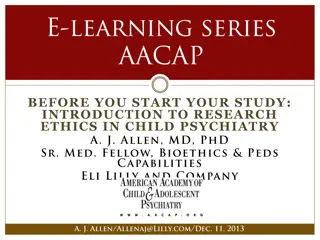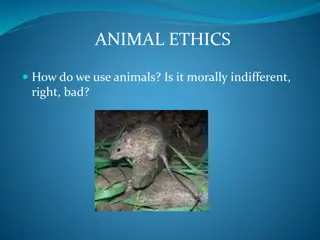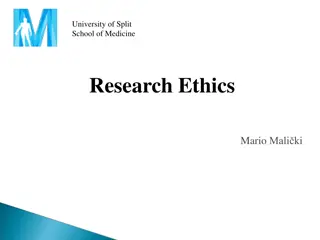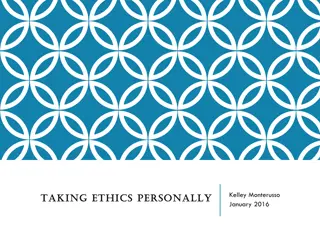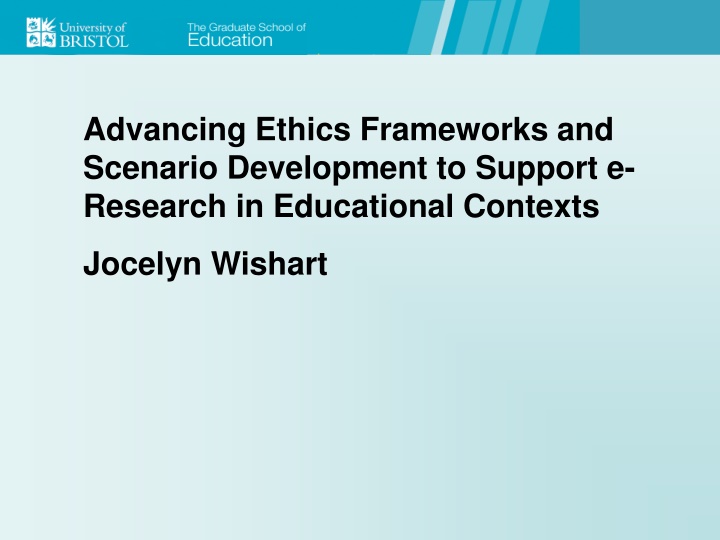
Advancing Ethics Frameworks in Educational e-Research
Ethical considerations in e-research within educational contexts, particularly in mobile learning, present challenges due to the complexities of using handheld devices. Issues such as access to personal information, lack of boundaries, and evolving research contexts are discussed alongside key ethical principles. Researchers provided insights on navigating boundaries, anonymity, accessibility, ownership, and participation.
Download Presentation

Please find below an Image/Link to download the presentation.
The content on the website is provided AS IS for your information and personal use only. It may not be sold, licensed, or shared on other websites without obtaining consent from the author. If you encounter any issues during the download, it is possible that the publisher has removed the file from their server.
You are allowed to download the files provided on this website for personal or commercial use, subject to the condition that they are used lawfully. All files are the property of their respective owners.
The content on the website is provided AS IS for your information and personal use only. It may not be sold, licensed, or shared on other websites without obtaining consent from the author.
E N D
Presentation Transcript
Advancing Ethics Frameworks and Scenario Development to Support e- Research in Educational Contexts Jocelyn Wishart
Advancing Ethics Frameworks and Scenario Development to Support e- Research in Educational Contexts Jocelyn Wishart Why did I start thinking about ethics? Study of Handhelds in Teacher Education
I found concerns arising when I or a trainee science teacher used a handheld mobile device in: Documenting evidence trainees progress against nationally set standards Using the camera recording one-off demonstrations Fieldwork bridging the classroom and the real world Reflecting on trainees errors should I have kept this image? Also found that personal use was important to trainees success at using the device to support learning but invasive?
So why are ethical issues in researching mobile learning a concern? handheld devices provide multiple opportunities for access to personal information including images their portability creates a lack of boundaries they link to both real and virtual contexts their capabilities are often poorly understood Also the classic approach of adhering to a fixed code of conduct or having your proposed methods first evaluated by an ethics committee does not deal well with the changing contexts arising in mobile learning research.
Four accepted ethical principles: Do good Avoid harm Autonomy (respecting choice) Justice (equal access to resource) Also where workplace involves those less able to look out for themselves - Duty of Care These can be used to frame the key concerns in mobile learning (Wishart, 2009) :
Researchers admitted ethical concerns: Boundaries - between formal and informal learning, public-private, home- school, real-virtual etc.; Anonymity - respecting it versus the need to respect some students desire to self-publish; Accessibility - people who are differently able and/or less educated or who may come from different cultures and what this means regarding costs e.g. for devices, to access internet; Ownership - whose data is on the mobile or on the server and who owns it? What about images? Is the owner the person taking the picture or is it the person in the picture; Participants Awareness - of their device capabilities, what data is being logged etc. Risk Analysis - the unexpected consequences of complexity and changing circumstances
Ethics Framework for Mobile Learning Projects Do good Avoid harm Autonomy Justice / Equal access Boundaries Anonymity Accessibility Ownership Awareness Risk analysis
Ethics Framework for Mobile Learning Projects Do good Avoid harm Autonomy Justice / Equal access Boundaries Anonymity Accessibility Ownership Awareness Risk analysis highlights opportunities to do good . Mobile learning has been shown to benefit a wide range of learners, including students from disadvantaged backgrounds and developing countries.
Scenarios, or simulated case studies, are a means of articulating issues from real-world experiences and of providing a vision or way forward for the future (Kamtsiou, Koskien, Naeve, Pappa & Stergioulas, 2006). Such an approach supports contextualisation of issues, exploration of multiple perspectives, reflection, and opportunities to develop collaborative solutions (Herrington, Oliver & Reeves, 2003). Their use in an ethics workshop (adapted from Howard, Lothen-Kline and Boekeloo (2004)) implies need for three elements: The scenario. An ethics framework, set of principles or ethical decision-making strategy in the context of which the scenario is to be considered. A set of questions to stimulate ethical discussion of the scenario.
Scenario: Where do you stop? Key Issue: Boundaries between formal-informal, public-private, home- school, real-virtual etc. Research question: What use can undergraduate university students make of social networks to support their formal learning? Description: This is a project funded by a National Teaching Innovation Grant and run by a university lecturer who is concerned that their topic is perceived by students to be a particularly dry one. They are interested in developing their teaching to make more use of collaborative learning opportunities enabled by students using mobile phones to access social networking sites at a time and place convenient to them. They have set a task to be completed on line through, say, Facebook, where students work with each other on a set task.
Scenario: Where do you stop? Questions to be considered: Who should be asked for consent and how should they be informed? When is a discussion on task and thereby included and when is it off- task ? What are the pros and cons of having the lecturer as a friend ? What are they to do on coming across unexpectedly personal information? How to anonymise the data? Other similar situations: Any research involving a mobile device that is used in personal as well as work contexts is likely to lead to access, wittingly or unwittingly, of personal information unrelated to the project. A participant may be unaware when giving consent to the research of the extent of the personal data stored on the phone.
Now it is your turn. Do good Avoid harm Autonomy Justice / Equal access Boundaries Anonymity Accessibility Ownership Awareness Risk analysis Think of a learning situation involving new technologies and use the above framework to develop a possible scenario. What are the ethical challenges?
For more detail see Andrews, T., Dyson, L. E., & Wishart, J. (2015). Advancing ethics frameworks and scenario-based learning to support educational research into mobile learning. International Journal of Research & Method in Education,38(3), 320-334.







